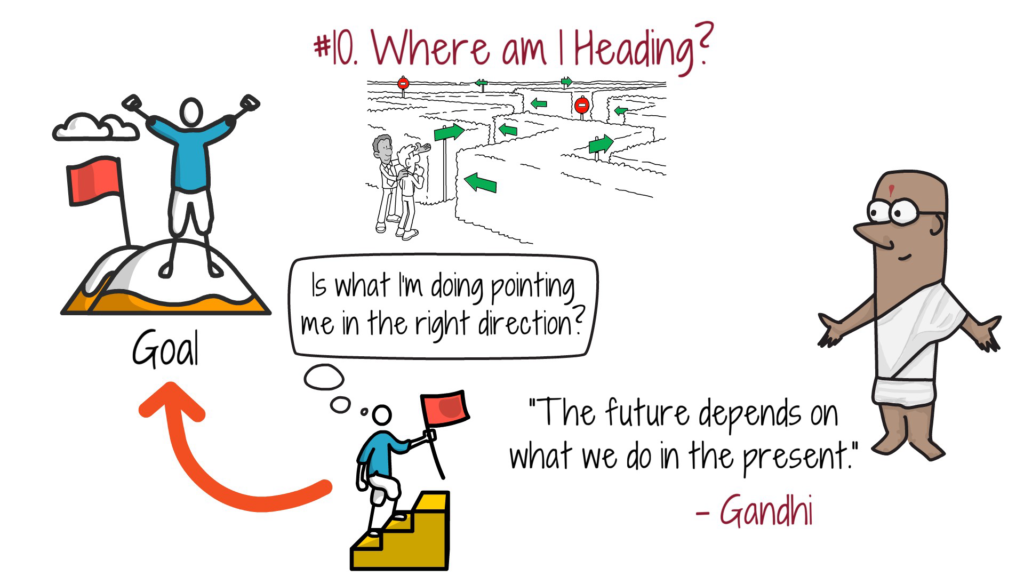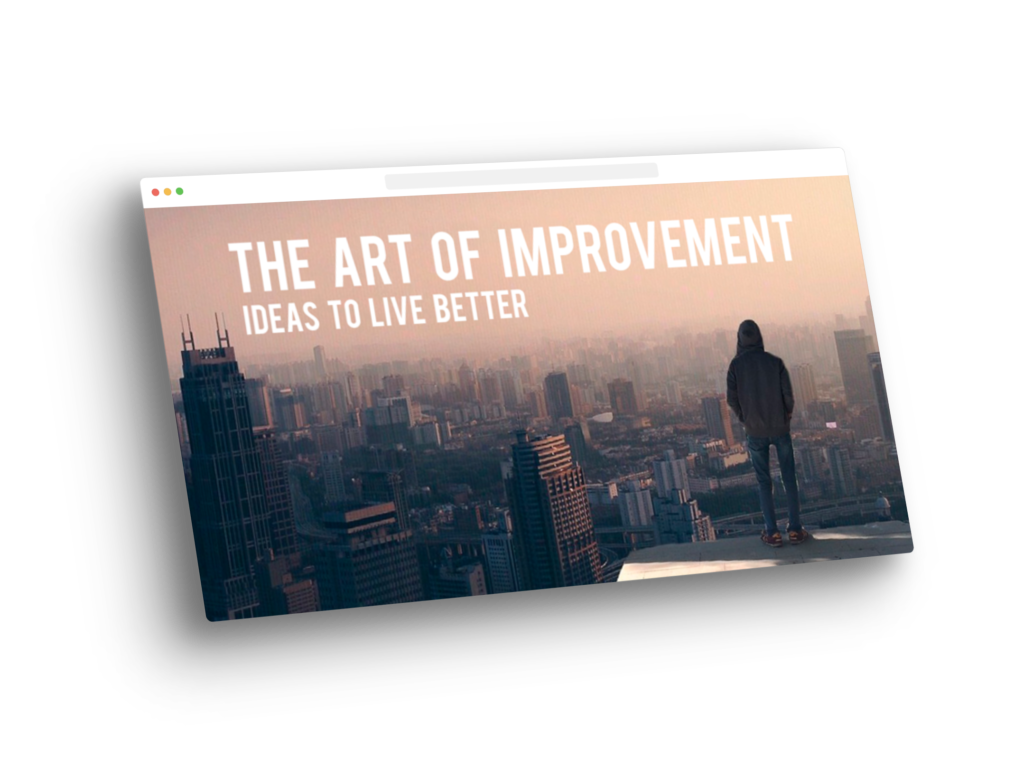Life is a process. We are always working on making improvements at a pace that works differently for each person. By constantly reassessing our thoughts and actions, we can know where to make changes to meet our goals.
Here are 10 questions to ask yourself frequently. Write them down and look at them on a regular basis to help know yourself better and navigate your course with clarity and awareness.
What am I Grateful for?
Having an “attitude of gratitude” is more than just being thankful for all the good stuff you have acquired. Being grateful shapes our perspective which in turn spills over into all areas of our lives.
Motivational speaker, Tony Robbins says,
“Being grateful activates different parts of your brain causing chemical reactions that affect both mental and physical health.” This mindset may help you experience less stress, better sleep, and make us happier and more optimistic. In turn, this improves our physical health, relationships and perpetuates even more to be grateful for.

What am I Thinking?
Being aware of your thoughts is vital to a healthy mindset. The term “Monkey Mind” came from Buddhist teachings describing how thoughts can jump from one thing to another, similar to how a monkey would jump from tree to tree. When your thoughts are constantly distracted it becomes difficult to focus on any one thing.
Ask yourself what you are thinking about at any given time. Is it a positive thought? Or are you spiraling downward in negative self talk? Identify your thoughts and make a conscious assessment about them. If you’re having a hard time taming your Monkey Mind, you might try taking a few minutes to breathe or meditate until you can take control.
Negative thinking can be toxic. Positive thinking puts you in a position of acceptance and possibilities. Staying positive does not mean everything will turn out okay. Rather, it means you will be okay no matter how things turn out.
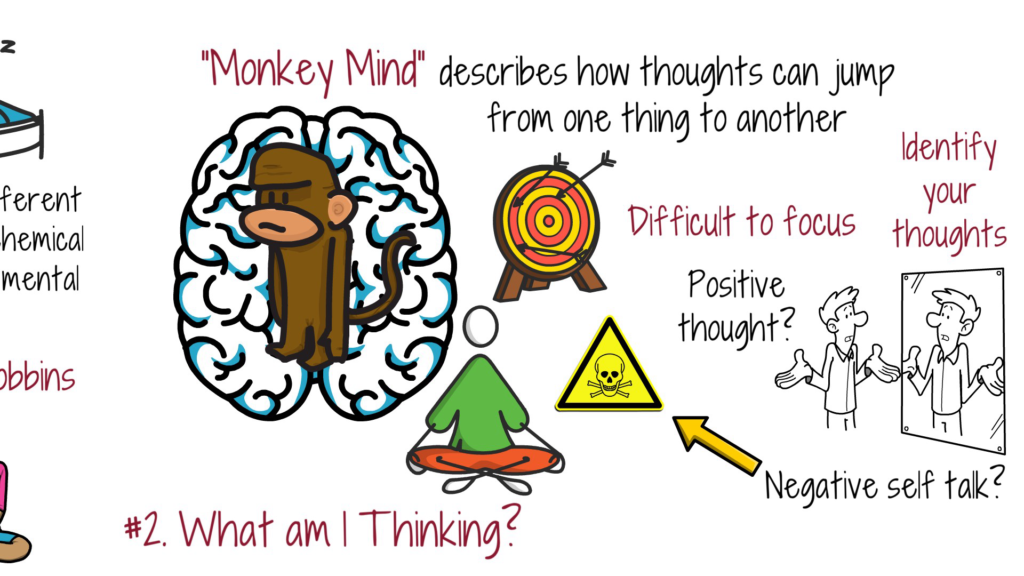
Am I Acting According to My Principles?
It can be easy to stray from acting in line with what you believe, especially if you’re tired or not feeling well. Sometimes you may be convinced to do something that you don’t feel good about later. Know what is important to you. And when situations arise, refer to your personal principles.
Life is always creating new challenges and new ways of doing things. President Jimmy Carter stated,
“We must adjust to changing times and still hold to unchanging principles.” What you value can be your guide to what action to take. Ask yourself what your principles are. Live by them and review them often.
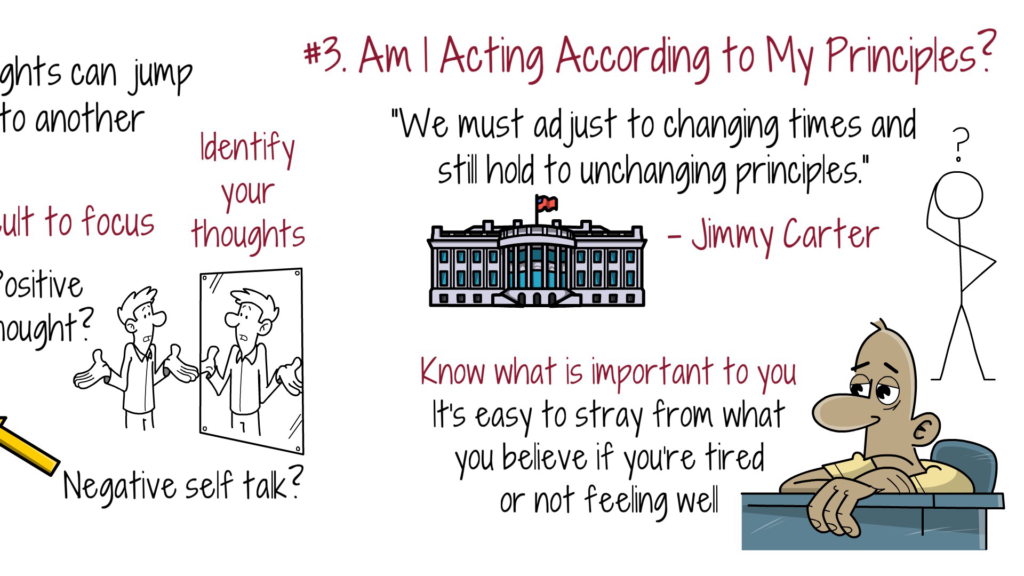
What am I Doing?
Author Annie Dillard writes,
“How we spend our days is, of course, how we spend our lives.“ Ask yourself if what you are spending your time on is creating the life you want to have.
Are you doing things that elevate and nurture you? Is this bringing out the best in you? Or is it dragging you down? When you are doing something you are passionate about you may have the feeling that time is standing still. Some call it “being in the zone.” If what you’re doing seems just the opposite, as if you’re stuck in a rut that never ends, you may want to rethink how you are spending the time you have been given.
Stephen Covey, author of 7 Habits of Highly Effective People wrote,
“The key is not to prioritize what’s on your schedule, but to schedule your priorities.”

Where/Who am I Spending My Time With?
Have you heard the saying “Birds of a feather flock together”? When you think about the people you spend time with, would you say they enhance your life? Or do they make it more difficult?
Are you spending time in places that are enriching and inspiring? Or are they more frustrating and stressful?
By asking yourself these questions you can think about restructuring what is working for you and what is not. People tend to be heavily influenced by their surroundings and the people they are with on a regular basis. Think about the people who have the lifestyles and values that you would like to have. Where would you like to be that makes you feel happy, relaxed and successful? By being aware of what you want, you can seek out the environments that most align with the life you want to create for yourself.
Author Edmund Lee wrote,
“Surround yourself with the dreamers and the doers, the believers and thinkers, but most of all, surround yourself with those who see the greatness within you, even when you don’t see it yourself.”

Am I Eating to Live or Living to Eat?
What is your relationship with food? Are you consuming healthy foods that will nourish you and promote good health? Are you grabbing a quick bite of whatever is handy? Or do you do meal planning: carefully choosing foods that give your body the nutrients it needs to function at optimal levels?
Do you eat to comfort yourself when in pain, boredom or sadness? Do you choose foods that just taste good and possibly eat too much of them? We are constantly bombarded with ads and offers for all kinds of foods. And our brains are wired to react to sights, sounds and smells that tempt us with promises of pleasure and satisfaction. But what are you really doing for your body? By asking this question each time you eat, you can be mindful of what choices you are making for your health.

Am I Holding onto Something I Need to Let Go of?
Sometimes in life we need to do a bit of decluttering. It can be comfortable to live with familiarity. But every so often, we may need to take a look at how things are going and do a little house cleaning.
When something is not working in our lives, we can ask ourselves if we need to do something differently or just let it go altogether. Whether it’s related to work, home, finances, relationships, health or something else, it can be helpful to assess what’s working for us and what’s not. Holding on to something that no longer serves you can be draining. Letting it go can open the door to other opportunities.
Author Eckhart Tolle wrote,
“Sometimes letting things go is an act of far greater power than hanging on.”

Am I Reacting or Responding?
When something happens do you typically react immediately? Or do you pause, think about it, and then respond? Author Bodhi Sanders tells us,
“When you react you let others control you. When you respond, you are in control.”
Reacting to something is rooted in survival instincts. There’s no time for considering words or actions. How accurate do you think you can be if you do something without thinking it through first?
Responding takes more thought. Jim Taylor, Ph.d, writes,
“We can stop and make a deliberate decision based on careful analysis of the circumstances.”
Author Charles Swindoll reminds us,
“Life is 10% what happens to you and 90% how you react to it”.

Am I Giving Back?
We’ve all heard the phrase, “it’s better to give than to receive.” While both can be enjoyable, there’s a reason why giving is a good thing. According to the Cleveland Clinic, studies show that giving can be good for your physical and mental health. Research says it can help lower blood pressure, promote self esteem, help you feel happier and even live longer.
Physicist Albert Einstein said,
“It is every man’s obligation to put back into the world at least the equivalent of what he takes out of it.”
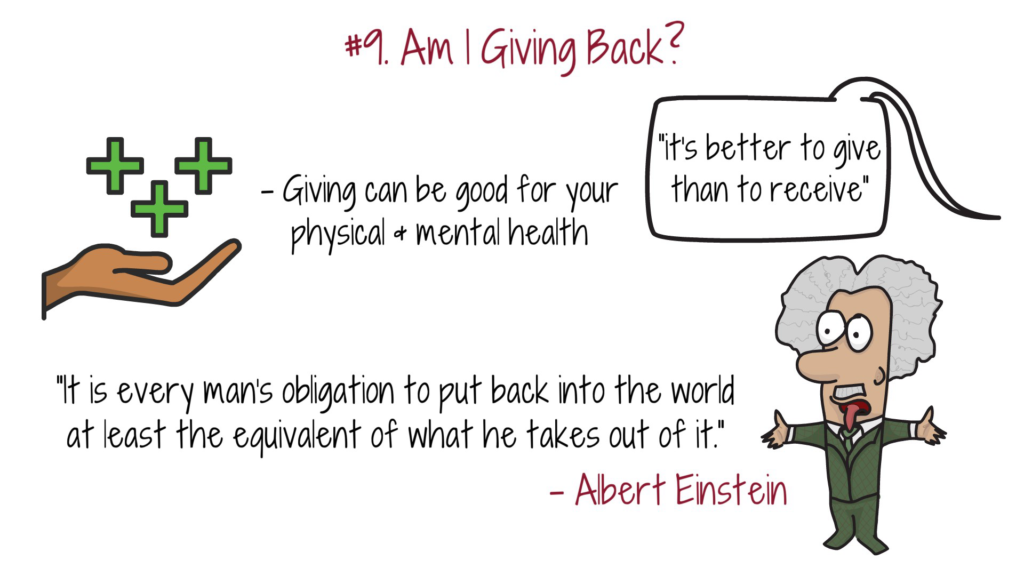
Where am I Heading?
Stay on track and ask yourself this question often. You wouldn’t get in your car and have no idea what direction you’re going or what your destination might be. Have a goal and always ask yourself if what you’re doing now is pointing you in the right direction.
Indian Leader Gandhi, stated,
“The future depends on what we do in the present.”
By checking in within yourself often, you can be sure to be more in alignment with the life you want to create, and acquire an awareness of how to stay on track to get there.
